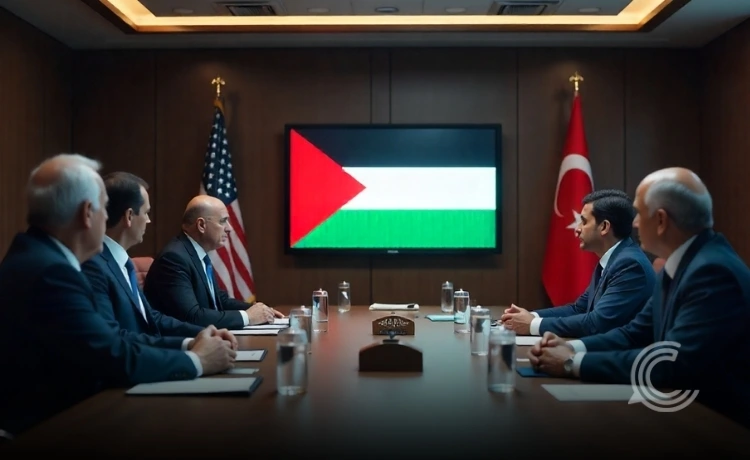US, Qatar, and Turkey Join Third Day of Gaza Peace Talks in Egypt

Key Highlights-
- US, Qatar, and Turkey join the third day of Gaza peace talks in Egypt
- Discussions focus on ceasefire, hostage release, and phased Israeli withdrawal
- Global protests and humanitarian crisis increase urgency for resolution
The United States, Qatar, and Turkey gathered in Sharm El-Sheikh, Egypt, on Wednesday, October 8, for a third day of indirect negotiations aimed at Gaza peace talks. The conversation involves Hamas and Israeli negotiators and is based on a 20-point plan proposed by US President Donald Trump, designed to secure a ceasefire and the release of hostages.
Global Powers Gather to End Gaza Conflict
Qatar’s Prime Minister Sheikh Mohammed bin Abdulrahman Al Thani, Turkey’s intelligence chief Ibrahim Kalin, Trump’s Middle East envoy Steve Witkoff, and Jared Kushner, Trump’s son-in-law, were among the key attendees. They highlighted the international push for a breakthrough. US President Donald Trump said in the Oval Office that there was “a real chance that we could do something” and has stressed the urgent need for the release of hostages immediately, as reported by AP News.
Ceasefire and Hostage Exchange at the Core
The Trump 20-point plan calls for Israel to allow humanitarian aid into Gaza, gradually withdraw troops, and release Palestinian prisoners, while Hamas agrees to disarm and return hostages.
Additionally, it is speculated that discussions have been held on Tuesday with Hamas, which included reviewing initial Israeli maps detailing troop withdrawals and the mechanism. Along with the timetable for the hostage-prisoner exchange.
Khalil El-Hayya, a Hamas negotiator, has emphasized that the group seeks guarantees from President Trump and sponsoring countries that the war would truly end once agreements are in place, according to CNA Asia Tonight. Furthermore, Analysts like James Dorsey, who is an adjunct senior fellow at NTU’s S Rajaratnam School of International Studies, have cautioned that while the principles of the plan are promising, it “lacks a practical enforcement mechanism or clear terms for implementation.”
War Anniversary and Rising Casualties
The negotiations coincided with the second anniversary of Hamas’s Oct 7 attack, which triggered Israel’s military campaign in Gaza. It has been reported that the attack killed 1,219 people in Israel, mostly civilians, and resulted in 251 hostages being taken into Gaza, of whom 47 remain captive.
Gaza has suffered devastating casualties. According to the Hamas-run health ministry, at least 67,160 people have died, with more than half being women and children. This is the figure that the United Nations considers credible. Observers note that both sides have faced allegations of war crimes, with the UN accusing Israel of potential genocide in Gaza; meanwhile, rights groups condemned Hamas for atrocities during the Oct 7 attack.
Global Protests and International Pressure
The global pressure to end this war has escalated more than ever. Hundreds of thousands of pro-Palestinian demonstrators rallied across Europe last weekend, in countries including Italy, Spain, Ireland, and Britain, demanding an immediate ceasefire, as reported by several news agencies. Furthermore, protestors in the Netherlands have urged their government to recognize a Palestinian state, while tens of thousands in Britain defied Prime Minister Keir Starmer’s call to skip rallies, holding vigils and gatherings marking the Oct 7 anniversary.
Challenges Ahead for Negotiators
While both Israel and Hamas have expressed initial willingness to negotiate, core issues remain unresolved, including hostage release, troop withdrawals, and Hamas’s political role in Gaza. According to analysts, bridging these gaps is of utmost importance in order to gain sustainable peace. Furthermore, the involvement of global powers like the US, Qatar, and Turkey can bring forth the diplomatic weight necessary to encourage compromise and prevent further escalation, as noted by Reuters and AP News.



